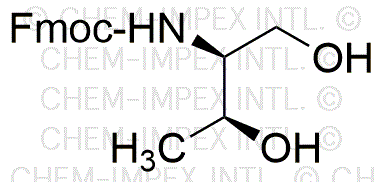Fmoc-D-Threoninol is widely utilized in research focused on:
- Peptide Synthesis: This compound serves as a key building block in solid-phase peptide synthesis, allowing for the efficient assembly of peptides with specific sequences and functionalities.
- Drug Development: Its unique structure aids in the design of novel pharmaceuticals, particularly in creating compounds that target specific biological pathways, enhancing therapeutic efficacy.
- Bioconjugation: Fmoc-D-Threoninol is employed in bioconjugation processes, facilitating the attachment of biomolecules to surfaces or other molecules, which is crucial in developing targeted drug delivery systems.
- Research in Glycobiology: This compound is useful in studying glycosylation processes, providing insights into carbohydrate-protein interactions that are vital for understanding various biological functions.
- Analytical Chemistry: It is utilized in the development of analytical methods for detecting and quantifying specific biomolecules, enhancing the accuracy and reliability of research findings.
General Information
Properties
Safety and Regulations
Applications
Fmoc-D-Threoninol is widely utilized in research focused on:
- Peptide Synthesis: This compound serves as a key building block in solid-phase peptide synthesis, allowing for the efficient assembly of peptides with specific sequences and functionalities.
- Drug Development: Its unique structure aids in the design of novel pharmaceuticals, particularly in creating compounds that target specific biological pathways, enhancing therapeutic efficacy.
- Bioconjugation: Fmoc-D-Threoninol is employed in bioconjugation processes, facilitating the attachment of biomolecules to surfaces or other molecules, which is crucial in developing targeted drug delivery systems.
- Research in Glycobiology: This compound is useful in studying glycosylation processes, providing insights into carbohydrate-protein interactions that are vital for understanding various biological functions.
- Analytical Chemistry: It is utilized in the development of analytical methods for detecting and quantifying specific biomolecules, enhancing the accuracy and reliability of research findings.
Documents
Safety Data Sheets (SDS)
The SDS provides comprehensive safety information on handling, storage, and disposal of the product.
Product Specification (PS)
The PS provides a comprehensive breakdown of the product’s properties, including chemical composition, physical state, purity, and storage requirements. It also details acceptable quality ranges and the product's intended applications.
Certificates of Analysis (COA)
Search for Certificates of Analysis (COA) by entering the products Lot Number. Lot and Batch Numbers can be found on a product’s label following the words ‘Lot’ or ‘Batch’.
Numéro de catalogue
Numéro de lot/série
Certificates Of Origin (COO)
This COO confirms the country where the product was manufactured, and also details the materials and components used in it and whether it is derived from natural, synthetic, or other specific sources. This certificate may be required for customs, trade, and regulatory compliance.
Numéro de catalogue
Numéro de lot/série
Safety Data Sheets (SDS)
The SDS provides comprehensive safety information on handling, storage, and disposal of the product.
DownloadProduct Specification (PS)
The PS provides a comprehensive breakdown of the product’s properties, including chemical composition, physical state, purity, and storage requirements. It also details acceptable quality ranges and the product's intended applications.
DownloadCertificates of Analysis (COA)
Search for Certificates of Analysis (COA) by entering the products Lot Number. Lot and Batch Numbers can be found on a product’s label following the words ‘Lot’ or ‘Batch’.
Numéro de catalogue
Numéro de lot/série
Certificates Of Origin (COO)
This COO confirms the country where the product was manufactured, and also details the materials and components used in it and whether it is derived from natural, synthetic, or other specific sources. This certificate may be required for customs, trade, and regulatory compliance.


